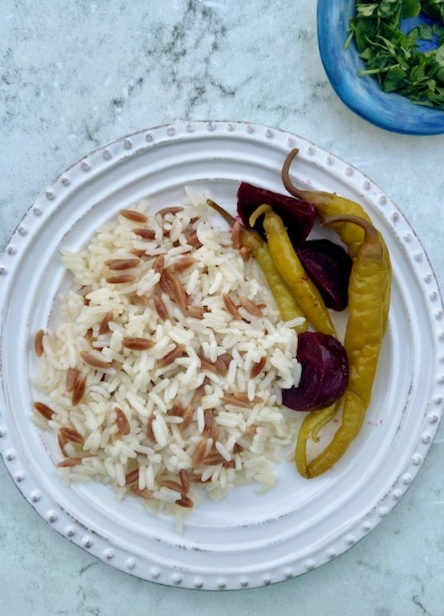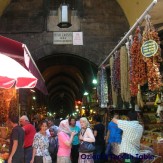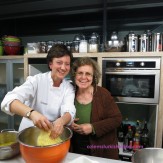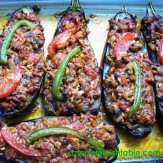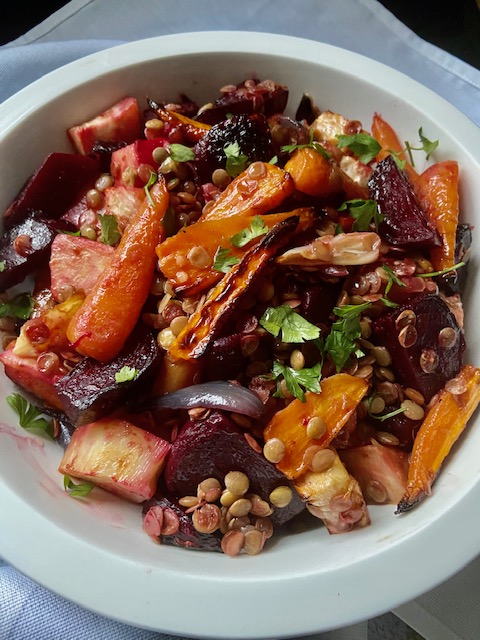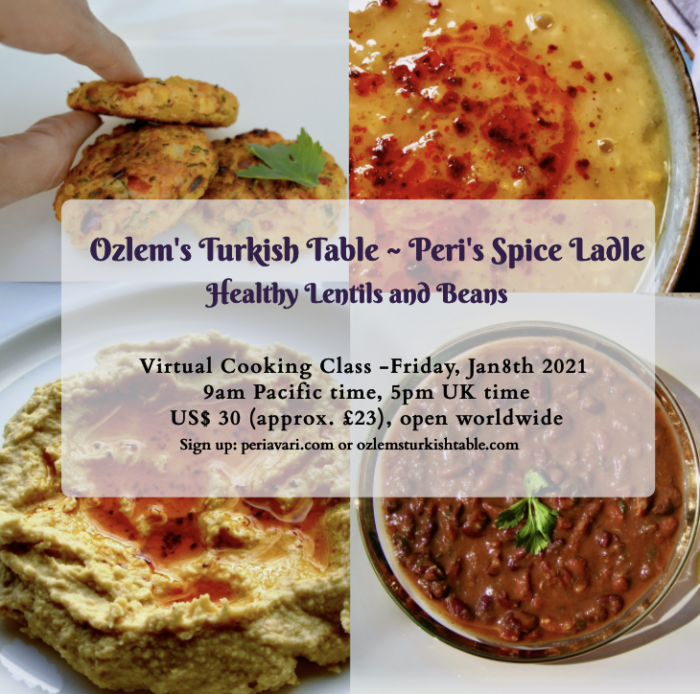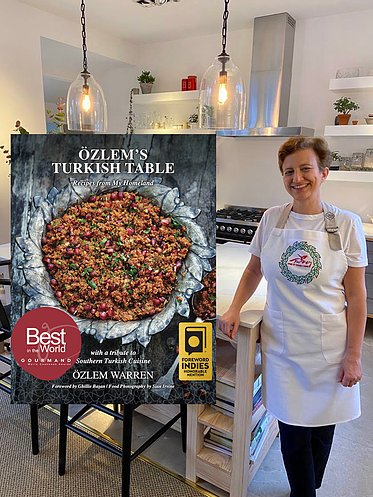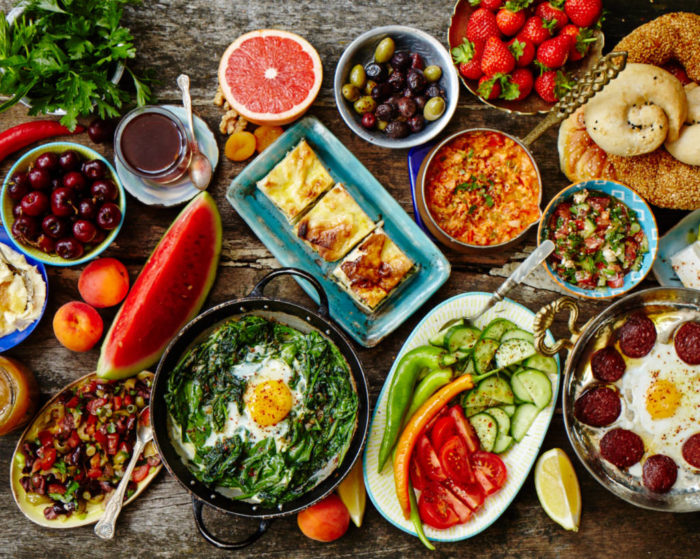
I love freekeh’s nutty, smoky flavor – it used to feature at lot at my grandmother’s table in Antakya; she would combine freekeh with seasonal vegetables, meat or sometimes just with bulgur and fresh butter, which always tasted heavenly.
This dish is popular in southern Turkish cuisine, using the season’s bountiful tomatoes and aubergines / eggplant or patlican. The meaty aubergines and juicy tomatoes are a great match here with the wholegrains – a fantastic, all in one pot plant based dish. Locals in southern Turkey use the glorious, ripe tomatoes in this dish; I opted to use a good quality chopped can tomatoes as living abroad, it is not always easy to get ripe, sun kissed tomatoes. I did however use some sliced fresh tomatoes – as ripe as I could find- to decorate the top of this lovely dish, and it added extra freshness and flavour.

Some backround information on freekeh. Firik, (as in Turkish) or Freekeh (sometimes spelled frikeh) or farik is a cereal food made from green drum wheat that goes through a roasting process in its production. Firik is a popular and ancient grain used Middle Eastern & Southern Turkish cuisine and also popular in Levantine, Egyptian, Arabian Peninsula and North African cuisine. The wheat is harvested while the grains are yellow and the seeds are still soft; it is then piled and sun-dried. The piles are then carefully set on fire so only the straw and chaff burn and not the seeds. It is the high moisture content of the seeds that prevents them from burning. The now roasted wheat undergoes further thrashing and sun-drying to make the flavor, texture, and color uniform. It is this thrashing or rubbing process of the grains that gives this food its name, farīk or “rubbed.” The seeds are now cracked into smaller pieces so they look like a green bulgur.
This delicious, ancient grain freekeh is a similar food made from barley and it is also mentioned in the Bible. Freekeh is also considered as a superfood, as in the category of the healthy grains such as quinoa and farro. Freekeh has at least four times as much fiber as some other comparable grains, consisting mostly of insoluble fiber. It also has a low glycemic index so is suitable for managing diabetes. You can get freekeh in Middle Eastern or specialty food stores abroad, though it is widely available in Turkey. Bulgur is now widely available in supermarkets, so great to see. If you like to use a gluten-free option, you can replace bulgur with quinoa.
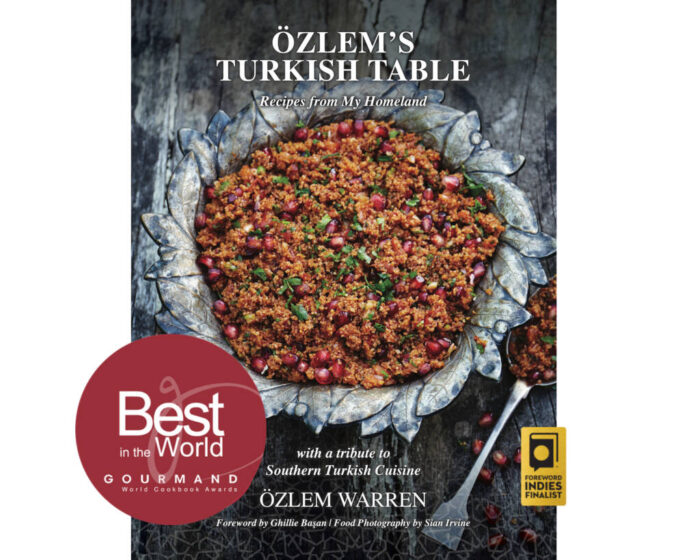
This is a bountiful dish and can easily feed 6 people or more. It also tastes great the next day and freezes well, so perfect for family meals or entertaining too. I also made another version of this Bulgur pilaf with aubergines, at my cookery book Ozlem’s Turkish Table (page 213), adding small chunks of meat there, if you fancy that version too. If you prefer not to use freekeh, you can omit and replace it with more bulgur here if you like. Signed copies of Ozlem’s Turkish Table cookery book is available at this link here and delivered worldwide, including the USA and Canada. You can also see ebook and other options here.
I hope you enjoy this delicious plant based recipe, Afiyet Olsun,
Ozlem
Bulgur pilaf with freekeh, aubergine, tomatoes – Firikli Sebzeli Bulgur Pilavi
Author: Ozlem Warren
Recipe type: Vegetarian, Vegan
Cuisine: Turkish
- 350g/12oz coarse bulgur, rinsed and drained
- 110g/4oz freekeh, rinsed and drained
- 3 medium aubergines, quartered and sliced in 1cm chunks
- 2 medium onions, finely diced
- 4 garlic cloves, finely diced
- 3 medium tomatoes, thinly sliced
- ½ tbsp. Turkish red pepper paste, biber salcasi
- 15ml/1tbsp concentrated tomato paste
- 400g/14oz (1 can of) chopped tomatoes in juice
- 60ml/ 2fl oz olive oil – for baking the aubergines –
- 30ml/2tbsp olive oil – for cooking-
- 900ml / 1.6 pints hot water
- 5ml/1tsp Turkish red pepper flakes, pul biber
- Salt and freshly ground black pepper to taste
- Handful of flat leaf parsley, finely chopped – to decorate
- Preheat the oven to 200C / 400F
- First prepare the eggplants (aubergines). Cut the aubergine in quarters and then slice into 1cm with pieces. Layer the aubergine pieces on a tray and sprinkle salt over them, leave them aside for about 10 minutes. After 10 minutes, dry the aubergines with kitchen or paper towel thoroughly.
- Spread the aubergine slices in a baking tray and pour in the 60ml/2floz olive oil over them. Using your hands, make sure that all aubergine slices have a nice coating of the olive oil. Bake for about 30 - 35 minutes in the preheated oven at 200C / 400F. Aubergines will start to get crispy around the edges, a nice color and soften up (you can alternatively sauté your aubergines on a pan with olive oil, though I find the baking easier and healthier).
- Heat the 2tbsp/30ml olive oil in a heavy, wide pan and sauté the onions for 2-3 minutes, until soft and they begin to color. Stir in the garlic, tomato paste, red pepper paste, can of chopped tomatoes, Turkish red pepper flakes, pul biber and combine well.
- Toss the sautéed aubergines to the pan and gently combine.
- Now stir in the rinsed bulgur and freekeh to the pan and mix well. Pour in the hot water and season with salt and freshly ground black pepper, combine well. Reduce the heat to low for simmering.
- Place the tomato slices over the top, cover and cook for 30 minutes, until the liquid is evaporated and the grains are cooked (add a little more hot water if needed). Check the seasoning and add more salt and freshly ground black pepper to your taste. Turn the heat off. I like to rest the dish and settle the flavours for 10 minutes before serving.
- Serve with refreshing Shepherd’s Salad, Coban Salatasi and/or Cacik dip with cucumber and yoghurt aside.
3.5.3251
Hands On Turkish Cookery Classes and events with Ozlem Warren in Fethiye and Kalkan, Turkey!
October 20th and 21st, 2020
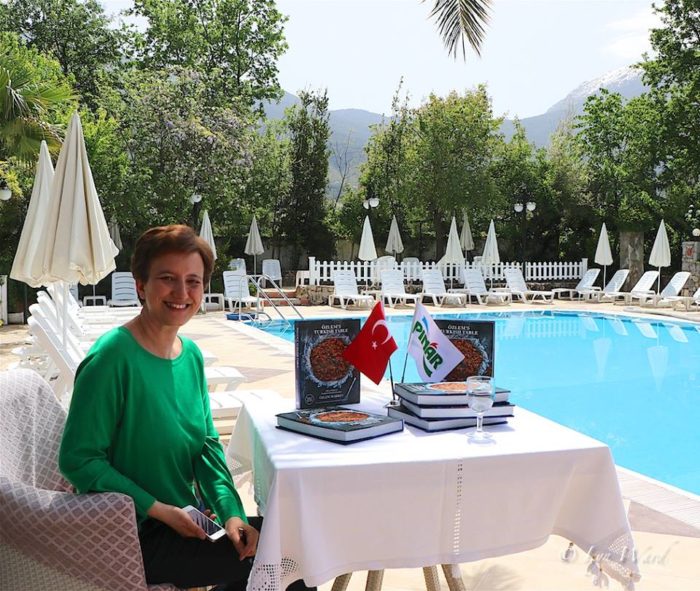
I am so delighted to be returning to Fethiye – Turkey, for a series of Hands on Turkish cookery classes and events and do hope you can make one of these, if you are nearby Fethiye.
Hands on Turkish cookery class on Tuesday, October 20th, 9.30am – 1pm at Yakamoz Hotel – Fethiye

Baklava; image from Ozlem’s Turkish Table cookery book, by Sian Irvine Photography
Please join us for a scrumptious hands on Turkish cookery class (including how to make home made baklava!) on Tuesday, October 20th, 9.30am – 1pm at Yakamoz Hotel – Fethiye, where we will cook a delicious menu from Ozlem’s Turkish Table cookery book together and then sit down and enjoy our creations at the Yakamoz Hotel’s beautiful grounds. Participation is limited, please visit my Cookery Classes page for all the details and registration.
If you like to join us at this fun and friendly hands on cookery class, please call Mehmet Yakamoz at +90 533 336 76 10 or email at yakamozone@hotmail.com to reserve your spot, participation is limited.
Turkish Style Lunch and Ozlem’s cookery demo and talk at Yakamoz Hotel, Fethiye
Tuesday, October 20th; 1.30pm – 4pm
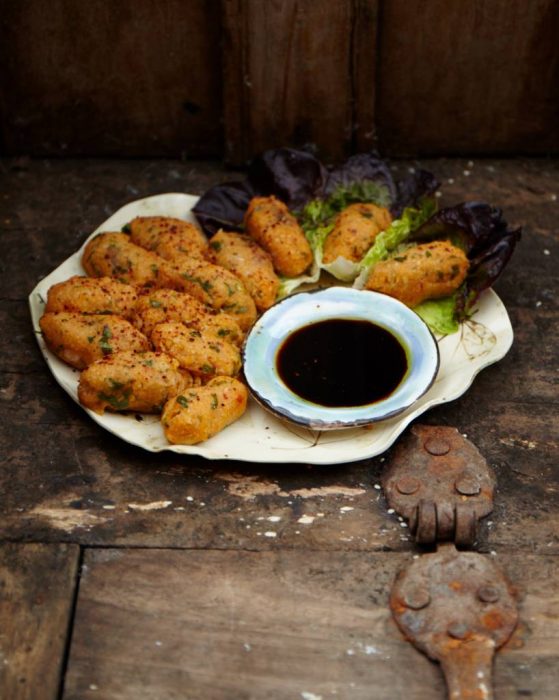
Potato and bulgur patties with pomegranate molasses, from my cookery book, Ozlem’s Turkish Table
Please join us for a scrumptions Turkish style lunch at Yakamoz Hotel, on Tuesday, October 20th; 1.30pm – 4pm. Ozlem Warren, author of Ozlem’s Turkish Table cookery book will be with us too, to give a talk on Turkish cuisine and demonstrate how to make Potato and bulgur patties with pomegranate molasses and will sign her cookery book, Ozlem’s Turkish Table, if anyone would like to get a copy.
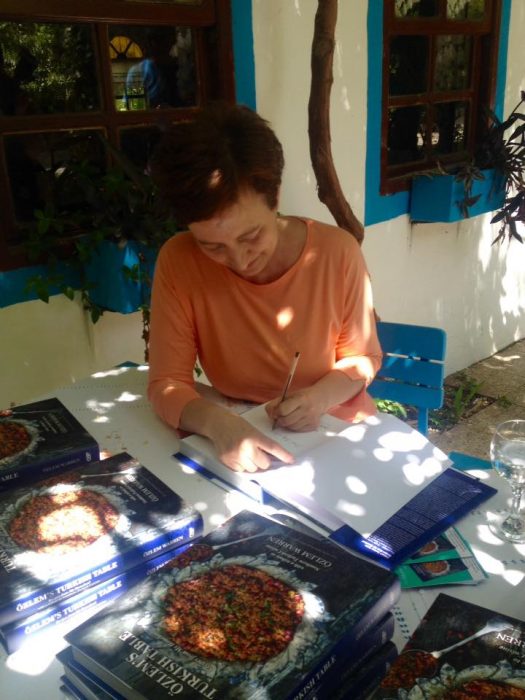
Ozlem’s Turkish Table book signing at Fethiye!
If you like to join us at this exciting event, please call Mehmet Yakamoz at +90 533 336 76 10 or email at yakamozone@hotmail.com to reserve your spot, participation is limited. Please visit my Cookery Classes page for more information.
Ozlem’s Turkish Table Hands on Classes at Guru’s Place Cookery School, Kalkan –
Wednesday, October 21st, 9.45am – 2pm
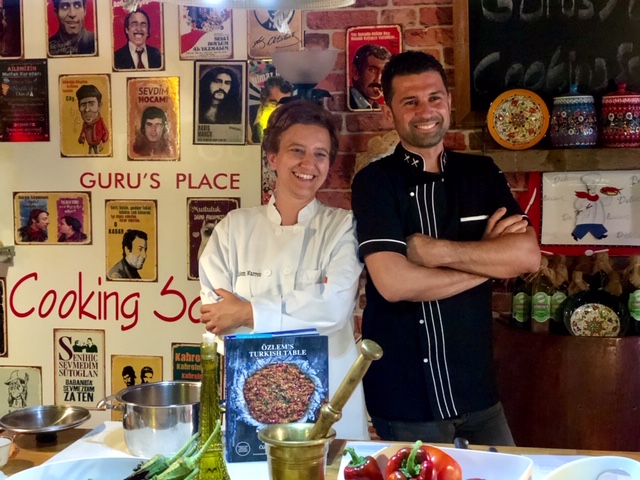
“Ozlem Warren, International cookery teacher and the author of Ozlem’s Turkish Table cookery book, is delighted to be visiting Guru’s Place Cookery School in Kalkan, on Wednesday, October 21st, 9.45am – 2pm, to co-teach hands-on cookery classes, with Huseyin Kayir, owner of the Guru’s Place Cookery School, Kalkan. We will cook together delicious Turkish recipes from Ozlem’s Turkish Table cookery book and then we will all sit down and enjoy our cooking, with a glass of wine. If you’d like to join the class, please kindly book your place and get in touch with Guru’s Place Cookery School at gurusplace@hotmail.com or call +905363311016. Participation is limited. Please visit my Cookery Classes page for full details of the class.

Baked zucchini with feta, spring onions and dill, Firinda Mucver
Do hope to be able to enjoy Turkish cuisine together with you in Fethiye in October, Afiyet Olsun,
Ozlem
